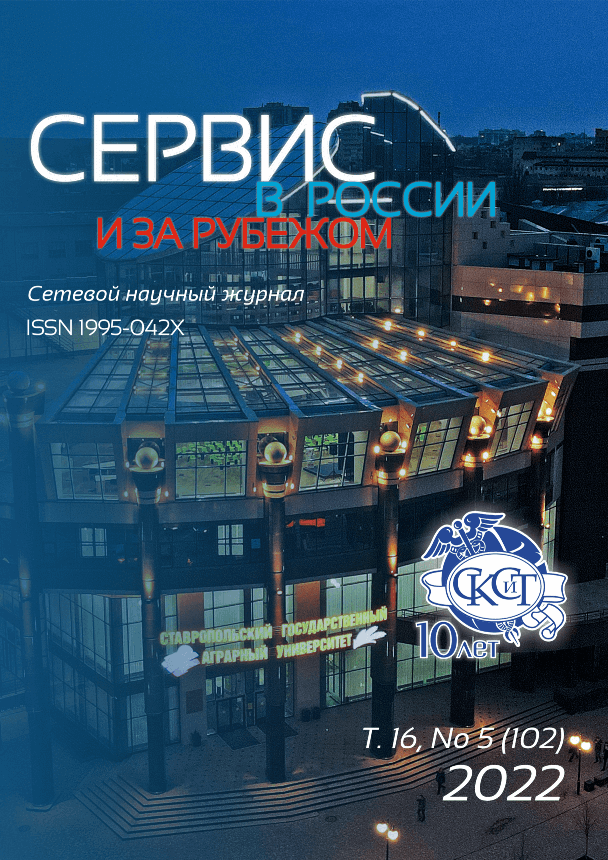The concept of ethnoecological tourism in Russian practices
DOI:
https://doi.org/10.5281/zenodo.7394947Keywords:
ecological tourism, ethnic tourism, ethno-ecological tourism, natural environment, cultural landscape, ethno-ecological tourism productAbstract
The problem of preserving the pristine nature and cultural landscape of indigenous peoples living in remote places of traditional nature management is becoming more acute with the economic development of territories by man. The solution to this problem is possible through the integrated approach combining both environmental and ethnic aspects. It is the ethno-ecological tourism demonstrates the close relationship between the ethnic group and the natural environment and ability to live in harmony with nature. However, in the scientific community there is no generally accepted definition of ethno-ecological tourism. In tourism practice, this type of tourism is not yet so widespread, represented by ecological and ethnic tours. The article provides a brief overview of sources that present different approaches to understanding the definition of ecological and ethnic tourism. The examples of the indigenous peoples’ traditional culture of the Far East prove that the way of life of an ethnic group (economic activity, material and spiritual culture) is determined by the surrounding nature. The ethno-ecological tourism in Far East region is located in 3 historical and ethnographic zones. The authors consider resource base of this type of tourism. The ethno-ecological tourism development is represented by such areas as ethnographic complexes, ethno-villages, ethno-parks, ethnographic centers and museums. Ethnographic complexes, ethnographic villages, ethnographic centers and museums have become widespread in the Far East region. The problem of preserving the natural environment and the habitat of the indigenous population can be addresses through a comprehensive approach to the ethno-ecological tourism organization. It implies partnerships among all interested parties, involving and training locals for this type of tourism.
Downloads
References
Абалаков А.Д., Панкиева А.С. Этноэкологический туризм в Байкальском регионе // Известия Иркутского гос. ун-та. Сер.: Науки о Земле. 2011. Т.4. №2. С. 3-16.
Барлукова А.Б. Классификационный статус этнического туризма // Известия БГУ. 2010. №4(72). С. 106-108.
Белова Е.С., Зенкина Е.В. Экологический туризм и проблемы его развития на примере Китая // Экономическая безопасность: современные вызовы и поиск эффективных решений: Мат. Всерос. науч.-прак. конф. Москва, 19.11.2020. М.: Московский ун-т им. С.Ю. Витте, 2020. С. 843-849.
Дорофеев А.А, Хохлова Е.Р. Природоохранная функция и состояние экологического туризма в Тверской области // Вестник ТвГУ. Сер.: География и геоэкология. 2018. №3. С. 261-270.
Козлов В.И. Жизнеобеспечение этноса: содержание понятия и его экологические аспекты // Этнос и среда обитания. Сб. ст. по этнической экологии. Вып.5. М.: Старый сад, 2017. 204 с.
Клоков К.Б., Михайлов В.В. Механизмы воздействия природных и социальных факторов на жизнеобеспечение локальных сообществ оленеводов в таежных и тундровых ландшафтах // Этнос и среда обитания. Сб. ст. по этнической экологии. Вып.5. М.: Старый сад, 2017. 204 с.
Коржанова А.А. Туризм как социокультурный ресурс развития современной России: Автореф. дисс. … канд. культур. М., 2011. 16 с.
Кржижевский М.В. Этнический туризм в Самарской области: особенности и перспективы развития // Современные проблемы сервиса и туризма. 2011. №2. С. 21-27.
Подмаскин В.В. Духовная культура удэгейцев XIX–XX вв. Историко-этнографические очерки. Владивосток: Изд-во Дальневосточного ун-та, 1991. 157 с.
Подмаскин В.В. Народные знания тунгуссо-маньчжуров и нивхов: проблемы этногенеза и этнической истории: Монография. Владивосток: Дальнаука, 2006. 540 с.
Сиротина И.Л. Этнический туризм как условие устойчивого развития региона // Известия Самарского научного центра РАН. 2015. Т.17. №1(2). С. 287-289.
Субботин О.С. Экологический туризм Кубани: Этнокультурные ресурсы и объекты историко-культурного наследия // Архитектура: Сб. науч. трудов. Мн.: БНТУ, 2020. Вып. 13. С. 134-139.
Downloads
Published
How to Cite
Issue
Section
License
Copyright (c) 2022 Barashok, I. V., & Derkacheva, L. N.

This work is licensed under a Creative Commons Attribution-NonCommercial-ShareAlike 4.0 International License.












